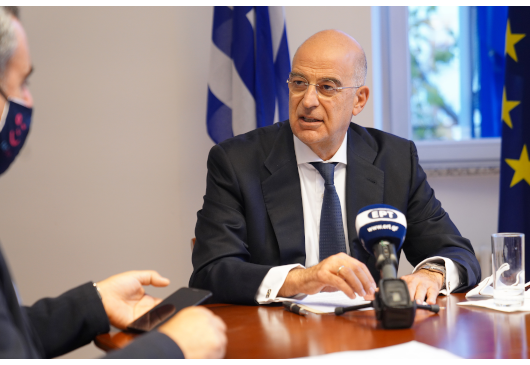 I had a number of meetings, first of all with the President of the Federal Republic, Mr. Steinmeier, with the President of the Federal Parliament, Mr. Schäuble, with the Bundestag Foreign Affairs Committee, the President of the European Affairs Committee, Mr. Krichbaum, and Federal MP Mr. Sarrazin, who is responsible for the Green Party’s foreign policy.
I had a number of meetings, first of all with the President of the Federal Republic, Mr. Steinmeier, with the President of the Federal Parliament, Mr. Schäuble, with the Bundestag Foreign Affairs Committee, the President of the European Affairs Committee, Mr. Krichbaum, and Federal MP Mr. Sarrazin, who is responsible for the Green Party’s foreign policy.
I had the opportunity to explain the challenges our country is facing and the challenges the European Union is facing in the wider region. I was able to explain in detail the impact of Turkey’s provocations, whether in Libya, Syria, Iraq, the Caucasus or in the maritime area around the Republic of Cyprus, in the Eastern Mediterranean, south of Kastelorizo and other Greek islands.
I also had the opportunity to set out Greece’s positions, how we have managed to conclude three important agreements – with Egypt, Italy and, most recently, Albania – always within the framework of international law, and to explain that the country that refuses to come to the negotiating table so that we can resolve our maritime-zone disputes in the framework of International Law is the country violating international legality: Turkey. In other words, Turkey is the common denominator in all of the instances of instability in our region.
I was also able to explain the dangers behind the transport of jihadists from Syria to Libya and from Libya to the Caucasus, and I explained Greece’s broader positions.
Finally, I said what Prime Minister Kyriakos Mitsotakis has expressed repeatedly: that we cannot have EU member states arming a country like Turkey – and arming it with major offensive weapons such as the German Type 214 submarine – which is threatening EU member states, such as Cyprus and Greece, and, in general, threatening stability in the region.
Allow me to say that I consider my presence here in Berlin today to be the start of a wider information campaign, an effort to reach a clear and common European outlook on the challenges in the Southeastern Mediterranean. An effort to ensure that we all have the same clear view of things.
REPORTER: [off microphone]
N. DENDIAS: The December European Council meeting is an important milestone because, following the decision of the previous Council meeting, the EU leaders will have to assess how Turkey has conducted itself in the meantime. And as long as Turkey acts as it is currently acting, I think the European Union has to respond in a clear manner that the Turkish government can understand.
November 4, 2020


